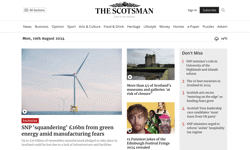According to the Newspaper Society: The Government’s proposed Royal Charter gives politicians the power to change the system of newspaper and magazine regulation – something that only 16% of the public supports. By a huge margin, 67% of people said that “the new press regulation system should be set up in a way that does not give politicians the final say if and when changes need to be made”, which is the basis of the Independent Royal Charter proposal.
The public also believes that there should be a public consultation on proposals to establish a Royal Charter – something the Government has consistently refused. Only 12% back the Government’s line that the public should be denied a say, while 76% believe “the Royal Charter should be subject to consultation so the public can have their say.”
54% of the public wants “a new tough system of press regulation set in place as soon as possible” – something that will only be possible under the Independent Charter. Fewer than one in three think a new system should be delayed until political parties and pressure groups agree to it.
Commenting on the findings, Damian Lyons Lowe, chief executive of polling company Survation said: “The public are clear that a new system of tough, industry financed press regulation is desired. 76% want be consulted on the structure of the Royal Charter and only 16% want politicians to have the final say if changes need to be made in future.”
The vast majority of newspapers in the UK are the 1100 regional and local newspapers which were exonerated of any wrongdoing by Lord Justice Leveson. The opinion poll shows that 53% of people view local papers as a positive force in their local community and only 8% think of them as a negative force.
Editors of regional and local newspapers across the country have been voicing their support for the Independent Royal Charter.
Simon O’Neill, group editor of the Oxford Mail group covering the Prime Minister’s constituency, said: “I support radical changes to the way Britain’s press is regulated, as I want no part of an industry that hacks phones and convicts innocent people on the front pages. But I will not accept a system that has been steamrollered through by self-interested politicians and pressure groups in the dead of night... [The Independent Royal Charter] offers a sensible and effective solution to the current stalemate.”
Nigel Pickover, Eastern Daily Press and Norwich Evening News editor-in-chief: “It is an Independent Royal Charter which will guarantee Britain remains the home of free speech. It will deliver what Lord Leveson called for… Politicians must accept this compromise solution or they will be culpable in threatening not least a regional press which millions of people rely on for news that is clear, truthful and unhindered by the vested interests.”
Alastair Machray Liverpool Echo editor and Trinity Mirror Merseyside, Cheshire and Wales editor-in-chief: “For me this is an excellent piece of work for three reasons: firstly it breaks what looked like deadlock; secondly it recognises that the regional newspaper industry is in no position to carry the huge financial risks inherent in the cross-party Royal Charter; and finally, crucially because it protects a freedom of the press that has served us brilliantly for 300 years.”
Ian Murray, editor-in-chief of the Southern Daily Echo in Southampton, said: “For 300 years a free press has been the cornerstone of British democracy. The Prime Minister said state regulation was ‘crossing the Rubicon’. The Independent Royal Charter will ensure the Rubicon is not crossed.”
Alan Edmunds, editor-in-chief at Media Wales and deputy editorial director for Trinity Mirror Regionals, said: “In the rush to settle on a response to the Leveson report there is the danger that parliament could weaken the press. In our efforts to expose crime and corruption at the highest levels of Government, industry and society, journalists have to deal with attempts by ruthless individuals to hide facts and intimidate both members of the public who want to speak out and reporters with a duty to let the truth be known. We must not unwittingly hand new weapons to those who have dark secrets to hide.”
The Independent Royal Charter was published on 25 April. National, regional and local newspapers and magazines were fully involved in devising the proposal and it has the support of all four trade associations: the Newspaper Society, representing the regional and local press, the NPA representing national newspapers, the PPA representing magazines and the Scottish Newspaper Society.
The Press Regulation Poll was carried out by Survation on behalf of the Free Speech Network. Survation interviewed a representative sample of 1000 adults aged 18+ online on 26th-28th April 2013. Data were weighted to match the profile of all British adults. Survation is a member of the British Polling Council and abides by its rules.










